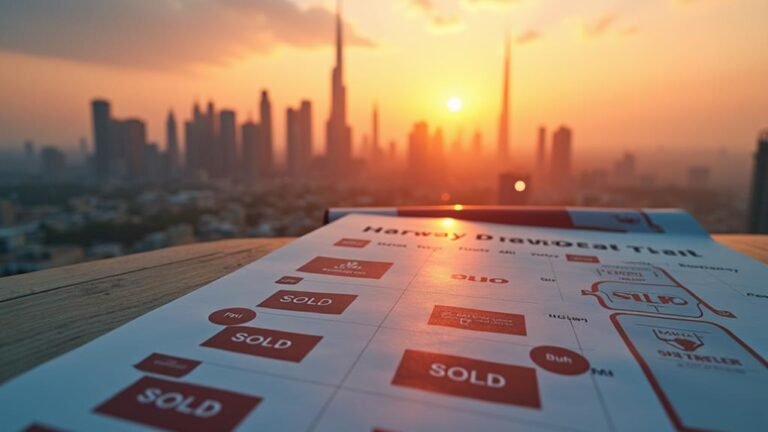How to Negotiate Repairs With the Seller

Negotiating repairs with property sellers in Dubai's competitive real estate market requires a strategic approach. While the emirate's modern infrastructure often means fewer issues in newer properties, it's still crucial to address any concerns before finalizing a purchase.
In Dubai, the process differs slightly from other markets due to local regulations and cultural norms. Buyers must balance their needs with the seller's expectations, considering the fast-paced nature of Dubai's property scene.
Understanding Dubai's real estate laws, common property issues, and negotiation etiquette is essential. This knowledge will help you prioritize necessary repairs and find mutually beneficial solutions. Let's explore how to navigate repair negotiations in Dubai's unique property landscape effectively.
Start by thoroughly inspecting the property with a qualified professional familiar with Dubai's building standards. This step is crucial in identifying potential issues that may need addressing.
Let us help you find the perfect property. Contact us to get started.
Prioritize repairs based on safety, functionality, and long-term value. In Dubai's climate, issues like air conditioning efficiency and water damage prevention are particularly important.
Research local repair costs to ensure your requests are reasonable. Dubai's market rates may differ from other regions, so accurate information is key to successful negotiations.
Consider the property's age and location when formulating your repair requests. Newer developments in prime areas may have different standards compared to older properties in established neighborhoods.
Communicate clearly and respectfully with the seller or their representative. In Dubai's multicultural environment, being mindful of cultural sensitivities can greatly improve negotiation outcomes.
Be prepared to compromise. Dubai's fast-moving market means sellers may be less inclined to make extensive repairs. Focus on critical issues and be flexible on minor concerns.
Key Takeaways
Negotiating repairs with sellers in Dubai's real estate market requires a tailored approach. The emirate's property landscape is unique, with a mix of ultra-modern high-rises and traditional Arabic-style homes. Understanding local building codes, common structural issues in desert climates, and the specificities of Dubai's property laws is crucial. Additionally, the city's rapid development means many properties are relatively new, potentially affecting the types of repairs needed.
When negotiating repairs in Dubai:
Focus on 3-5 critical issues that align with local building standards and climate considerations. Prioritize repairs related to air conditioning systems, water damage, or structural integrity, which are particularly important in Dubai's harsh environment.
Obtain quotes from Dubai-based contractors familiar with local building materials and techniques. This ensures accurate cost estimates and compliance with emirate-specific regulations.
Consider requesting repair credits instead of seller-completed work. This approach is often more practical in Dubai's fast-paced real estate market and allows buyers to manage repairs according to their preferences.
Differentiate between necessary repairs and cosmetic improvements. In Dubai's luxury-oriented market, it's crucial to focus on essential fixes rather than aesthetic upgrades, which may be subject to personal taste.
Leverage your local real estate agent's expertise in Dubai property laws and market norms. Their knowledge of emirate-specific negotiation tactics can be invaluable in communicating repair requests effectively.
Prioritize Your Repair Requests
When negotiating repairs for Dubai properties, focus on the top three to five critical issues that significantly impact safety, functionality, or value. These may include structural problems, electrical or plumbing issues, or major AC system damage. Concentrating on the most crucial concerns increases your chances of reaching an agreement with the seller in Dubai's competitive real estate market.
Review your property inspection report carefully. Identify items posing the greatest risk or expense, prioritizing accordingly. Consider factors like the building's age, repair costs, and potential long-term consequences of unaddressed issues. Differentiate between essential repairs and cosmetic improvements you can handle post-purchase.
Create a clear, concise list of top priorities to present to the seller. Provide specific details about each issue, including supporting documentation from the inspection report. Be prepared to explain why these repairs are crucial and how they affect the property's overall value in Dubai's market.
Focus on vital issues to demonstrate reasonable requests and increase the likelihood of successful negotiation. Remember that Dubai's real estate laws and regulations may impact repair negotiations, so consult with a local real estate professional for guidance.
Understand the Seller's Perspective
To negotiate repairs effectively in Dubai's property market, understanding the seller's perspective is crucial. Consider that sellers may have priced properties with existing issues in mind or might be working within tight budgets. They could be under pressure to sell quickly due to personal circumstances or market conditions. In Dubai, sellers are often required to disclose known defects but aren't obligated to fix every issue. They might prefer addressing major structural problems or safety concerns rather than cosmetic issues.
Sellers in Dubai may opt to offer credit towards repairs instead of completing the work themselves, finding it more convenient and cost-effective. In competitive markets, sellers might be less inclined to negotiate repairs if they've multiple offers.
Dubai's real estate landscape is unique, with many properties being relatively new or well-maintained due to the city's rapid development. However, older properties in areas like Deira or Bur Dubai may require more extensive negotiations for repairs.
Consider the cultural aspects of negotiation in Dubai, where building relationships and maintaining face are important. Approach repair discussions diplomatically, focusing on mutual benefits rather than confrontation.
Get Multiple Repair Quotes
When negotiating property repairs in Dubai, gathering multiple quotes from reputable contractors is crucial. This process provides accurate cost estimates and strengthens your position. Ensure you give each contractor the same detailed information about the issues for precise comparisons.
Aim for at least three quotes per repair item to understand average costs and identify outliers. Consider the contractor's reputation, experience, and licensing alongside the price. Don't automatically choose the lowest bid; quality and reliability are equally important in Dubai's competitive real estate market.
Organize the quotes in a clear, easy-to-read format. This preparation allows you to present a well-documented case to the seller during negotiations. By having multiple quotes, you demonstrate due diligence and base your requests on fair market values, enhancing your negotiating position.
In Dubai's unique real estate landscape, be aware of local regulations and building standards. Some repairs may require specific approvals or certifications, which can affect costs and timelines.
Consider the property's location and type when evaluating quotes. Repairs in luxury developments or older areas of Dubai may have different pricing structures compared to newer communities.
Focus on Safety Issues
Dubai's stringent safety regulations make addressing potential hazards crucial during repair negotiations. Prioritize issues that could pose risks to occupants or compromise structural integrity. Focus on faulty electrical wiring, plumbing leaks, mold growth, and structural defects. Emphasize rectifying safety concerns to ensure compliance with local building codes and regulations.
Provide documentation from your home inspection report highlighting safety issues. Include cost estimates for necessary repairs when possible. Be prepared to explain how these concerns could impact property value and your ability to obtain insurance or financing.
Prioritize fire safety repairs, such as smoke detectors, fire extinguishers, and proper ventilation systems. Address potential fall hazards like loose handrails or uneven flooring. For properties with pools or water features, ensure proper safety measures are in place.
Consider Dubai-specific safety requirements, such as earthquake-resistant construction and high-rise fire safety systems. Discuss the implementation of smart home technologies for enhanced security and energy efficiency.
Consider Repair Credits
In Dubai's dynamic real estate market, considering repair credits can be a strategic approach when negotiating property purchases. While safety is paramount, repair credits offer a flexible alternative to seller-completed repairs. This option involves reducing the purchase price or closing costs to cover estimated repair expenses, allowing buyers to manage repairs post-closing.
Repair credits can simplify negotiations and benefit both parties. To implement this approach effectively, obtain accurate estimates from licensed contractors in Dubai for necessary repairs. Discuss potential credits with your lender, as they may impact loan terms. Be aware that some Dubai lenders have limits on seller concessions.
When proposing repair credits, provide detailed documentation to justify your requests. Sellers in Dubai may prefer this option, as it relieves them of repair responsibilities during a busy period. However, carefully consider the scope of repairs and your ability to manage the work after closing before opting for credits.
Be Willing to Compromise
In Dubai's dynamic real estate market, compromise is key to successful negotiations. When discussing property repairs with sellers, a flexible approach is essential. While you may have a list of desired fixes, prioritize critical issues related to safety, structural integrity, and major systems functionality. The unique characteristics of Dubai's property market require adaptability and strategic thinking.
Consider the seller's perspective and be open to alternative solutions. They might offer a price reduction instead of completing repairs themselves. This can be advantageous if you prefer to manage the work personally or believe you can achieve better results independently.
Dubai's market conditions play a crucial role in negotiation strategies. In a seller's market, you may need to be more flexible with repair requests to remain competitive. Understanding the local real estate landscape is vital for making informed decisions.
Remember that compromising doesn't mean settling for less. It's about finding mutually beneficial solutions that satisfy both parties. By approaching negotiations with a willingness to compromise, you increase your chances of securing a favorable deal in Dubai's real estate market.
Set Realistic Expectations
Setting realistic expectations is crucial when negotiating repairs in Dubai's property market. Sellers aren't obligated to fix every issue, so focus on significant defects impacting safety, functionality, or value. Consider structural problems, electrical hazards, plumbing issues, or major appliance failures. Dubai's market conditions play a vital role in your negotiation power. Research comparable properties to gauge reasonable expectations.
In Dubai's older neighborhoods like Deira or Bur Dubai, properties may have more wear and tear, requiring additional repairs. Newer areas like Dubai Marina or Downtown Dubai might've fewer issues but higher prices.
Dubai's climate can affect property conditions. Look for signs of sand or heat damage, especially in older buildings. Air conditioning systems are crucial and should be thoroughly inspected.
Differentiate between necessary repairs and cosmetic improvements. Sellers in Dubai are more likely to address essential fixes rather than aesthetic upgrades.
Consider local regulations and building codes specific to Dubai when negotiating repairs. Some modifications may require approval from relevant authorities.
Leverage Your Real Estate Agent
In Dubai's competitive real estate market, your agent is a crucial asset when negotiating repairs with sellers. They provide invaluable insights into local market conditions and property values, shaping your negotiation strategy. Your agent can help prioritize repair requests, focusing on issues critical to the property's value or safety. Their experience in similar negotiations allows them to gauge what's reasonable to ask for in Dubai's unique real estate landscape.
Your agent's communication skills are vital in presenting repair requests professionally to sellers. They can frame these requests in a way that's more likely to be well-received, potentially leading to smoother negotiations. Acting as a buffer, they maintain emotional distance beneficial in negotiations.
Your agent can objectively assess counteroffers and advise whether to accept, reject, or continue negotiations. They may suggest alternative solutions if sellers hesitate about repairs, such as price reductions or repair credits.
In Dubai's fast-paced property market, your agent can expedite the negotiation process, ensuring you don't miss out on opportunities. They're familiar with local regulations and can ensure all repair agreements comply with Dubai's real estate laws.
Conclusion
Negotiating repairs with sellers in Dubai's real estate market requires a strategic approach. Safety issues should be your top priority, followed by major structural concerns. Understanding the seller's perspective is crucial, as is leveraging your real estate agent's local expertise. Obtain multiple quotes from reputable Dubai-based contractors to strengthen your position. Consider requesting repair credits instead of actual repairs, which can be more appealing to sellers in Dubai's fast-paced market. Be prepared to compromise, focusing on critical repairs that significantly impact the property's value.
In Dubai, it's essential to set realistic expectations due to the unique nature of the market. Many properties are relatively new, so extensive repairs may not be common. However, issues like air conditioning systems, plumbing, and electrical wiring should be carefully inspected and addressed.
Dubai's real estate regulations may impact repair negotiations. Familiarize yourself with local laws and consult with your agent about standard practices in the emirate. Some sellers may be more willing to negotiate on price rather than undertake repairs, especially in a competitive market.
Consider the property's location within Dubai when prioritizing repairs. Coastal properties may require different attention than those in the desert areas. Factor in the local climate and environmental conditions when assessing the importance of various repairs.
Be mindful of cultural differences when negotiating in Dubai. Maintain a respectful and professional demeanor throughout the process. Building a positive rapport with the seller can often lead to more favorable outcomes in repair negotiations. It is important to also be aware of the importance of personal relationships in business dealings in Dubai. Taking the time to get to know the seller and showing genuine interest in their culture and traditions can go a long way in building trust and rapport. This can be particularly beneficial during the sales agreement signing process, as a strong relationship can help navigate any potential misunderstandings or disagreements that may arise.
Let us help you find the perfect property. Contact us to get started.






